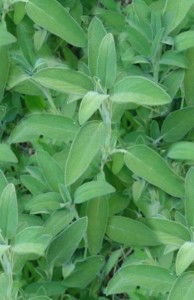 Sage – Salvia Officinalis is a savory evergreen herb with woody stems, grayish leaves, and blue or purplish flowers. Sage is an herb that is most commonly used as an infusion, extract, tincture, poultice and spice.
Sage – Salvia Officinalis is a savory evergreen herb with woody stems, grayish leaves, and blue or purplish flowers. Sage is an herb that is most commonly used as an infusion, extract, tincture, poultice and spice.
The name Salvia comes from the Latin salveo, salvare – which means to save.
Sage can be used as a remedy for respiratory infections, nasal congestions, coughs, tonsillitis and sore throats. It is also a stimulant for appetite, relieves indigestion and has a beneficial effect on the liver. It’s given for night sweats, nervous sweating and kidney and urinary-tract problems. Some women also find that it helps to alleviate menopausal symptons.
Sage herb parts have many notable plant derived chemical compounds, essential oils, minerals, vitamins that are known to have disease preventing and health promoting properties.
Essential oils provide it with the mucus-thinning and antiseptic properties that make it ideal for a gargle, wound dressing, vaginal rinse, enhances concentration, attention span and quickens the senses. Its effects help deal with grief and depression. Sage’s bitter constituents relieve digestive difficulties with their appetite-stimulating effects and work to strengthen the constitution overall. Sage leaf contains numerous other substances including cineol, borneol, tannic acid; bitter substances with cornsole and cornsolic acid; fumaric, chlorogenic, caffeic and nicotinic acids; nicotinamide; flavones; flavone glycosides; and estrogenic substances. These compounds are known to have counter-irritent, rubefacient, anti-inflammatory, anti-allergic, anti-fungal and anti-septic properties.
This herb is exceptionally very rich source of many B-complex groups of vitamins, such as folic acid, thiamin, pyridoxine and riboflavin with many vitamins several times more than recommended levels. Sage contains very good amounts of vitamin A and beta carotene levels. Vitamin A is a powerful natural antioxidant and is essential for vision. It is also required for maintaining healthy mucus membranes and skin. Consumption of natural foods rich in vitamin A known to helps body protect from lung and oral cavity cancers.
Sage herb parts, whether fresh or dried, are rich source of minerals like potassium, zinc, calcium, iron, manganese, copper, and magnesium. Potassium is an important component of cell and body fluids which helps control heart rate and blood pressure. Manganese is used by the body as a co-factor for the antioxidant enzyme superoxide dismutase.
Sage is a classic example of why herbs can score over man-made cocktails of chemicals, because as time goes by, research is discovering more and more benefits of this seemingly simple herb, which in the ancient used about everything..
Preparation of sage tea: Add one teaspoon of sage to one cup of boiling water and soak in a covered cup for 5 – 10 minutes. Add a bit of honey to enhance the taste.
Sage tea is beneficial in coping with stress. It is astringent, sedative and expels gas. It clears the respiratory tract, makes a good gargle for sore throats and helps overcome colds.
From our catalog you can order Sage.
 Български
Български
Leave a Reply